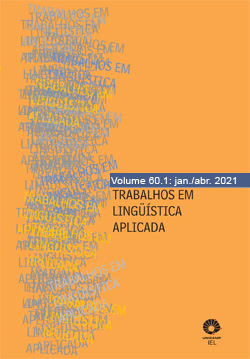Abstract
This interview explores how intellectual resistance occurs not solely though opposing the intellectual content of dominant knowledge, but also by criticizing the very rules that are used to determine what counts as knowledge. Specifically, we examine how epistemology constitutes a site both of intellectual oppression and intellectual resistance. This tension will be problematized here through the life history and professional performance of researcher Patricia H. Collins from the University of Maryland, College Park, US, which will bring to light her experiences and experiences not only of oppression and resistance in an intersectional perspective. This important issue will be presented, discussed, and problematized based on four fundamental axes: a) Her education and her professional performance; b) Criticism and decoloniality; and c) Impact of her research for the Global South; and d) Politics and perspectives in Critical Applied Linguistics. The concept of intersectionality is linked to the positioning of black feminism and emerges as an epistemological and methodological project to make visible the crossing of structural oppressions: race, social class, gender, which sustain inequalities and social vulnerabilities.
References
AKOTIRENE, C. Interseccionalidade. São Paulo: Editora Pólen, 2019.
COLLINS, P. H. Black Feminist Thought: knowledge, consciousness, and the politics of empowerment. New York: Routledge, 2009.
COLLINS, P.H. Em direção a uma nova visão: raça, classe e gênero como categorias de análise e conexão. In: MORENO, R. (Org.) Reflexões e práticas de transformação feminista. São Paulo: SOF, p. 13-42, 2015.
COLLINS, P. H. Aprendendo com a outsider within: a significação sociológica do pensamento feminista negro. Revista Sociedade e Estado, vol. 31, n. 1, Janeiro/Abril, p. 99-127, 2016.
COLLINS, P. H. Se perdeu na tradução? Feminismo negro, interseccionalidade e política emancipatória. Parágrafo, [S.l.], v. 5, n. 1, p. 6-17, jun. 2017. ISSN 2317-4919. Disponível em: <http://revistaseletronicas.fiamfaam.br/index.php/recicofi/article/view/559>. Acesso em: 08 out. 2020.
COLLINS, P. H. “Pensamento feminista negro: o poder de autodefinição”. In: HOLLANDA, H. B. (Org.). Pensamento Feminista: conceitos fundamentais. Rio de Janeiro: Bazar do Tempo, 2019. p. 271-312.
COLLINS, P. H. Interseccionality: As critical social theory. Durham: Duke University Press, 2019.
COLLINS, P. H.; BILGE, S. Intersectionality. Malden, MA: Policy Press, 2016.
GOMES, N. L. Educação, identidade negra e formação de professores/as: um olhar sobre o corpo negro e o cabelo Crespo. Educação e Pesquisa, São Paulo, v.29, n.1, p. 167-182, jan./jun. 2003.

This work is licensed under a Creative Commons Attribution 4.0 International License.
Copyright (c) 2021 Trabalhos em Linguística Aplicada


